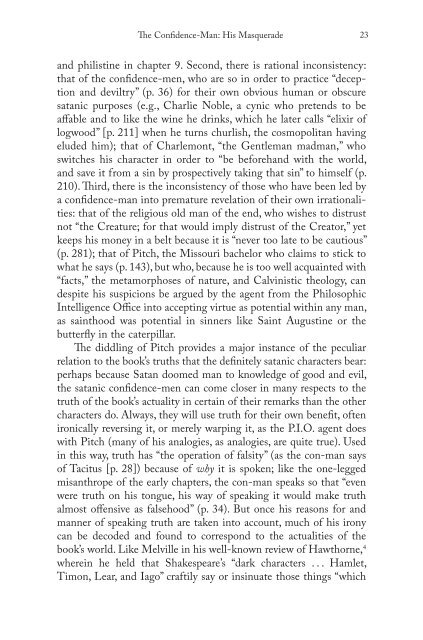Blooms Literary Themes - THE TRICKSTER.pdf - ymerleksi - home
Blooms Literary Themes - THE TRICKSTER.pdf - ymerleksi - home
Blooms Literary Themes - THE TRICKSTER.pdf - ymerleksi - home
You also want an ePaper? Increase the reach of your titles
YUMPU automatically turns print PDFs into web optimized ePapers that Google loves.
Th e Confi dence-Man: His Masquerade 23<br />
and philistine in chapter 9. Second, there is rational inconsistency:<br />
that of the confi dence-men, who are so in order to practice “deception<br />
and deviltry” (p. 36) for their own obvious human or obscure<br />
satanic purposes (e.g., Charlie Noble, a cynic who pretends to be<br />
aff able and to like the wine he drinks, which he later calls “elixir of<br />
logwood” [p. 211] when he turns churlish, the cosmopolitan having<br />
eluded him); that of Charlemont, “the Gentleman madman,” who<br />
switches his character in order to “be beforehand with the world,<br />
and save it from a sin by prospectively taking that sin” to himself (p.<br />
210). Th ird, there is the inconsistency of those who have been led by<br />
a confi dence-man into premature revelation of their own irrationalities:<br />
that of the religious old man of the end, who wishes to distrust<br />
not “the Creature; for that would imply distrust of the Creator,” yet<br />
keeps his money in a belt because it is “never too late to be cautious”<br />
(p. 281); that of Pitch, the Missouri bachelor who claims to stick to<br />
what he says (p. 143), but who, because he is too well acquainted with<br />
“facts,” the metamorphoses of nature, and Calvinistic theology, can<br />
despite his suspicions be argued by the agent from the Philosophic<br />
Intelligence Offi ce into accepting virtue as potential within any man,<br />
as sainthood was potential in sinners like Saint Augustine or the<br />
butterfl y in the caterpillar.<br />
Th e diddling of Pitch provides a major instance of the peculiar<br />
relation to the book’s truths that the defi nitely satanic characters bear:<br />
perhaps because Satan doomed man to knowledge of good and evil,<br />
the satanic confi dence-men can come closer in many respects to the<br />
truth of the book’s actuality in certain of their remarks than the other<br />
characters do. Always, they will use truth for their own benefi t, often<br />
ironically reversing it, or merely warping it, as the P.I.O. agent does<br />
with Pitch (many of his analogies, as analogies, are quite true). Used<br />
in this way, truth has “the operation of falsity” (as the con-man says<br />
of Tacitus [p. 28]) because of why it is spoken; like the one-legged<br />
misanthrope of the early chapters, the con-man speaks so that “even<br />
were truth on his tongue, his way of speaking it would make truth<br />
almost off ensive as falsehood” (p. 34). But once his reasons for and<br />
manner of speaking truth are taken into account, much of his irony<br />
can be decoded and found to correspond to the actualities of the<br />
book’s world. Like Melville in his well-known review of Hawthorne, 4<br />
wherein he held that Shakespeare’s “dark characters . . . Hamlet,<br />
Timon, Lear, and Iago” craftily say or insinuate those things “which

















